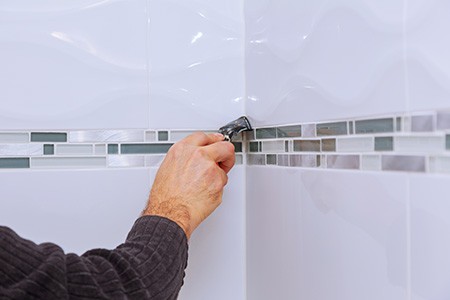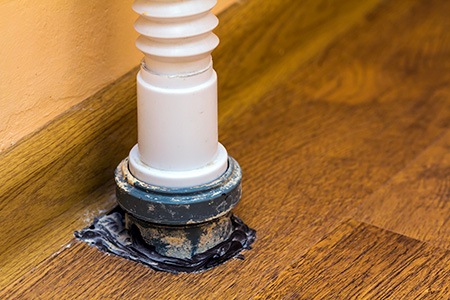Acetone Smell in Your House? Let's Remove the Odor
Author: Omar Alonso | Editor: Omar Alonso
Review & Research: Jen Worst & Chris Miller

Does your home smell like a nail polish remover? What's causing the noxious stench wafting through the rooms? There could be several reasons for the problem – some are harmless, nothing to worry about, and others are hazardous. Regardless, an acetone smell in your house should be attended to immediately.
There are plenty of reports in online forums where homeowners swear they can smell nail polish remover in their homes, but no one in the house is using it. It's one of the great mysteries of homeownership.
Your home smells like nail polish remover due to the presence of "acetone" vapors in the air. Acetone is the primary ingredient used in nail polish remover products, and its powerful corrosive action strips away hardened nail polish in seconds. So, it can't be good to smell these fumes in your home.
What Causes an Acetone Smell in a House & How to Remove It?
Acetone has a distinct smell, and it's easy to identify. However, finding the source of this chemical odor in your home might not be as simple. Let's run through what causes acetone smell in houses and how to remedy the problem with a few strategies.
Nail Polish Remover

First, let's start with the obvious. If someone in your family used nail polish remover, you'd smell the vapors in your home. The vapor could travel through the air column, reaching other rooms. If someone spilled a bottle of the stuff, the acetone "gasses off" into the air, producing the scent.
Cleaning it up will accelerate the removal of the odor. For instance, here are six ways to get nail polish off your wall. Getting rid of as much of it as possible will help the rest dry, evaporate, and dissipate. Then you can air out your home and you can kiss that smell goodbye.
Refrigerator Gas Leaks
If no one was using nail polish remover or spilled a bottle of it on the floor or the dressing table, the next thing to check is the fridge. This appliance relies on refrigerant to produce a cooling effect. If your refrigerator is taking too long to get cold, that's a big giveaway that you may have this problem.
If the fridge has a leak in the cooling system, the gas exits through the leak and enters the air. Refrigerant smells like acetone, and it spreads through every room in the home. If the smell of acetone intensifies as you approach the fridge, you know it's a problem.
Fridges used to use and old ones still do use a chemical called freon to produce a refrigerant effect. Leaking freon presents a health hazard if you breathe in too much of it, and it can cause irritation of the eyes, skin, sinus, and upper respiratory tract.
If you find the fridge is leaking, remove it from your home and leave it outdoors. It is likely the cause of the acetone smell in your house and is more risky to allow it to linger. Call a fridge repair company to collect the unit for repairs and re-gassing. It's a relatively expensive process, so depending on the size and age of your fridge, you might want to consider replacing it with a new model instead of sending it for repairs.
HVAC Systems & Air Conditioners

If the fridge isn't the source of the problem, the next step is to check your home's HVAC and air-conditioner systems. Unlike fridges, these devices don't rely on refrigerants like freon to produce a cooling effect.
If you notice the scent of acetone gets stronger as you turn on the air-conditioner or HVAC unit, it's probably due to a build-up of mold spores in the system. If the bad smell is coming from one vent only, then that helps you narrow down the location of the problem. Air conditioners and HVAC units usually come with HEPA filters designed to catch particulate matter in the air.
Mold spores are microscopic and clog up the filters, resulting in a chemical smell similar to acetone. Try to identify the type of mold you're dealing with to decide if you need to contact a professional about it. If your air intake is in the basement, check around there, because this is one way mold in a basement can affect upstairs rooms.
Mold Spores
The air-conditioner and HVAC are the first appliances to check for signs of mold build-up or infestations. However, they aren't the only locations in the home where you'll find mild infestations. Mold likes to grow in dark, damp, cool conditions. The basement is usually the first place to look.
If you open the basement door and find the smell of acetone intensifies, you're probably dealing with a mold infestation. Mold comes into the home from outdoors. The microscopic spores can easily float in on a gust of air in the window and into the basement or attic.
If the conditions are right for the mold to spread, it sets up shop and starts growing. The mold will release spores into the air, producing the smell. Some species of mold, like black mold, are highly pathogenic – meaning they make you very sick.
You'll start noticing the symptoms of mold sickness a few days after you notice the smell, and you must remove the infestation immediately. If the mold infestation is small, you can remove it using a diluted bleach solution to kill the spores. You'll need to call a professional mold removal service if there are multiple locations or a large infestation.
Drying Caulk

If you recently caulked the tiles in the bathroom or the skirting around the living room, it's the caulk causing the acetone smell in your home. This material seals cracks and waterproofs joints, and it's common for contractors to use it in home maintenance projects.
Caulk contains chemicals that gas off as it fries, with the fumes entering the air, causing the vinegary-acetone-like smell. The smell won't harm you unless you breathe it in all day. The scent usually stops when the caulk hardens after the gassing-off process finishes.
Open the doors and windows in the room and let fresh air enter the space. Increasing the ventilation in the room dilutes the vapors in the air and drives the smell away. It may take a little longer to dry if you caulked over caulk, but it'll still be fairly quick. If you smell an acetone smell in your house in but just in a specific area you've recently caulked and painted, this is probably the cause.
Drying Paint
If you've recently painted a room and noticed an acetone smell, it's due to the paint drying. As the paint dries, it releases "Volatile Organic Compounds" (VOCs) into the air. VOCs are hazardous to your health if you have prolonged exposure to them.
For instance, sleeping overnight in a freshly painted room will likely result in you waking up with a headache or feeling dizzy and confused. Prolonged exposure to VOCs can cause serious health issues.
Some paints have higher levels of VOCs than others. For instance, oil-based paints usually have three times the VOC levels as latex paints. If you're painting a room, do it in the morning and give the room time to dry and air out before sleeping in it at night.
Look for brands of latex paints that advertise "Low VOCs." These paints usually have one-firth to one-tenth the VOC levels in standard latex paints. Give the paint time to dry and look into how long it takes spackle to dry as well since you probably used it to patch holes and gouges in the walls.
Sewer Gas Leaks

If you have a sewer gas leak in your home, it might result in the rooms filling with an acetone-like scent. If your roof plumbing vent is clogged or the P-trap under the sink runs dry, or cracks and leaks, nothing stops the sewer gases from entering your home.
Check under the sink. If you notice the smell intensifies, it's probably a crack in the P-trap. Check for signs of water underneath it. If it's dry, you could have a blockage in the roof plumbing vent. This causes an air-pressure imbalance in the system, resulting in the P-trap running dry. Call a plumber for assistance removing the blockage and restoring the air pressure in the plumbing system.
How Do You Fix Air Conditioner & Refrigerant Leaks?
Acetone is a gaseous by-product from the breakdown of chlorofluorocarbons (CFCs) in refrigerant gases. If the fridge experiences a gas leak, it releases an acetone-like scent into the air around the appliance.
If you have a gas leak in the fridge, you might have perished door seals, resulting in the compressor needing to work harder. Eventually, the compressor fails and can start leaking refrigerant into the air. You can't use a DIY fix to resolve the problem.
You'll need a professional to look at the appliance and quote you on fixing it. If your apartment smells like nail polish remover, contact your landlord immediately.
FAQ's Regarding an Acetone Smell in Your House

Let’s look at some common questions that arise when you find a nail polish smell in your house.
How Long Does the Acetone Smell in My House Take to Go Away?
Acetone can hang around in the air in your home for days if you don't ventilate the space. If you go on vacation, lock up your home, and the refrigerant leaks, it can remain in the air and smell for up to 22 days before breaking down. If you come home from vacation and the house smells like acetone, the fridge is likely the culprit.
Can an Acetone Smell in the Air Harm the Environment?
Breathing in too much freon from a leaking fridge harms your health. However, you need prolonged exposure to it for the gas to cause severe damage. If you smell acetone in the air while doing your nails, chances are it won't have any lasting effect on your health.
Are Acetone Vapors Harmful to My Health?
Is an acetone smell in your house dangerous? When you breathe in acetone or freon, the vapors enter your lungs and dissolve into your bloodstream alongside the oxygen you breathe. The bloodstream carries the acetone into all your body's organs and biological systems.
The liver and kidneys are responsible for breaking down the acetone and excreting it from the body. Prolonged exposure to acetone or freon vapors causes headaches, confusion, racing pulse, nausea, blood cell count and size changes, and unconsciousness.
Key Takeaways for When a House Smells like Nail Polish Remover
- If you smell acetone in your home, it could be someone spilling nail polish remover or doing their nails.
- A leaking fridge releases freon gas that smells like acetone.
- If you have a blockage in the roof plumbing vent or a dry or cracked P-trap, sewer gases will enter your home. Sewer gases can have an acetone-like smell.
- Mold spores from infestations in the air-conditioner or HVAC system can also cause an acetone-like smell.
Dealing With the Acetone Smell in Your House
Help! My house smells like paint thinner or nail polish! We’ve listed many of the reasons this can occur, from a leaking bottle of either to refrigerator or air conditioner leaks, as a few examples. You need to use the process of elimination to locate the exact source and then deal with it in the manner suggested above. Then you’ll be rid of the acetone smell in your house for good.



